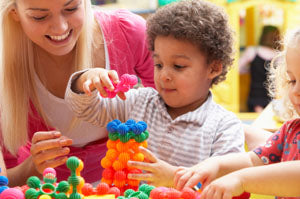Autistic children (children with Autism Spectrum Disorders) are just like other children. They want to do what kids do best; play and have fun. That’s what being a child is all about. Play offers essential learning opportunities for autistic children, but given that play is not always an easy thing for autistic children to do, this learning opportunity is often limited.

When thinking about activities for autistic children it is important to think outside the square. The things that engage and motivate these kids may not be quite the same as for other children. It is also true that no two autistic children are the same. What works for one child may be of no interest to the next. It’s tricky business. Parents, carers, teachers and everyone else involved need to be keen observers and think about what it is that makes the child they are working with tick. Once you have an idea of the kinds of things your children find engaging you can use these to plan activities for autistic children. Try to focus on the child’s strengths and interests.
Many children are really interested in electronic devices including video games and are often very talented in this area. While it is very important that children have a range of leisure interests and things that they can do on their own it must be remembered that autistic children in particular need to have frequent opportunities to interact with others in order to develop their social and communication skills, so like anything electronic devices should be available and used in moderation.
As we have had the pleasure of working with many autistic children and children with special needs over the course of our careers, we have had to be creative and always thinking on our feet. Our experience has helped us to understand the kinds of activities that these children might find engaging and interesting. Let us share some of these with you..
- Games- there are some great board games available at department stores and toy shops that offer fantastic opportunities to practice skills like turn taking, sharing and waiting. When choosing games try to select those that do not take too much time to complete.
- Movement based activities - many children with autism are always on the go. They enjoy moving around; climbing, running, swinging, crashing... sometimes these interests can get them in to trouble as they might seek this movement in unsafe ways. Why not use this interest to engage them? Activities like swinging (in hammocks, on swings or in blankets) can be great fun. They are also a good opportunity to practice anticipation games like “ready, set, go”. Trampolines (both indoor and outdoor) are great ideas for kids who like to move. Physio / swiss (fit) balls are also fantastic for inside use. You can bounce, roll, crash and do all kinds of other great things with them.
- Messy play - some children really enjoy messy play and will seek it out, while others can be a little reluctant to touch messy / sticky things. Either way, it is a good idea to offer children opportunities to engage in messy play at their own pace of course. Things like playdough, shaving cream, gellibaff, gak and even paper mache can be fun activities for children to do.
- Music, song, dancing - music is motivating for many children and often even children with sound sensitivity enjoy it. Think about how you can integrate music and song into activities you do with your child everyday. For example, when playing ‘farms’ why not sing “Old McDonald” together? It can also be fun just to sing and dance together without props.
- Construction activities - children like to build all sorts of creative masterpieces, but sometimes it can be hard for them to build things from scratch without direction. Next time you construct something together try taking a photo of it so that you can use it as a guide for next time. This will help your child to organise, sequence and have more success when participating in construction activities in the future.
- Art and craft - as many autistic children are strong visual learners they can find art and craft activities including drawing really fun and motivating. Art and craft is a fantastic language activity and also offers important opportunities to develop fine motor skills. Make sure these activities are pitched at your child’s level though; if they are struggling with the activity you might need to think about modifying it so they are able to better participate.
Happy playing and learning.
My Diffability Australia
My Diffability Australia - resources for different abilities


